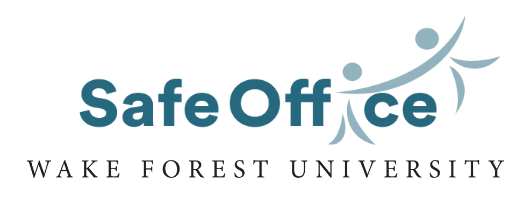Resources for Parents and Families
College is an exciting environment full of new experiences and new relationships that will significantly shape the lives of students during these early years of adulthood. Away from the familiarity of home and family, we at Wake Forest University strive to create a safe and supportive environment for students as they forge ahead on these new paths; yet we understand that parents and caregivers also continue to hold an important and invaluable role in helping your students navigate life at college.
As you prepare your student for college life, it’s important to have conversations with your student about safe and healthy relationships and consent, just like you’re having conversations about the importance of academics! We recognize that not everyone may feel comfortable broaching this topic with their student, so we have created a conversation guide to help parents and caregivers feel more equipped to start these important conversations.
Promoting Healthy Relationships
New relationships are essential to the college experience, and students will find many opportunities for making friends and dating. As they prepare to enter this new social world, now is a good time to talk with your student about how to develop healthy relationships with others.
The five keys to a healthy relationship are Respect, Learn, Empower, Consent, and Communicate. Helping your student understand how to cultivate these in all their relationships will give them the tools they need to create a positive campus culture.
- Respect: Promote and model healthy attitudes and relationships; treat others the way you want to be treated.
- Learn: Access credible information and resources to promote your overall health; when you have a question, seek answers from a credible source.
- Empower: Everyone has the right to set limits, feel safe, and get support; you deserve to be respected and listened to.
- Consent: Seek mutual agreement without fear or pressure; ask for consent, and check in frequently to make sure consent is clear.
- Communicate: Express yourself to partners, peers, and family; you can talk openly and honestly with people you trust. If you notice something is wrong, you can speak up.
We also encourage parents and caregivers to be aware of organizations that promote education around healthy relationship dynamics:

Need to leave the website quickly?
Safe Office
Need immediate assistance?
24/7 Confidential Support Line
Have a non-urgent question?
Visit Us!
Wake Safe App

- Mobile BlueLight: send your location to and call WFU PD simultaneously.
- Friend Walk: sends your location in real-time to a friend so they can watch you as you walk to your destination!
- Social Escape: allows you to get out of a tough social situation by calling you and giving you an excuse to leave.
- We Are Wake: a comprehensive call to care for the mental health of all students.
- Campus Support Resources
Understand Consent
Consent is an essential element for healthy relationships and how to respect personal boundaries and the boundaries of others. Consent is important in many aspects of our daily lives, not just in sexual relationships, and it is a vital part of clear and honest communication.
Understanding consent helps students understand their own boundaries and communicate those boundaries clearly with others, as well as respecting others’ boundaries. Learn more about consent from our campus partner The Office of Wellbeing.
Supporting Your Student
- As a parent or guardian of a student, you never want to imagine your child could be harmed by interpersonal violence. But for survivors, having support and help from family is essential. Here are some steps you can take to help your student if something has occurred, or you are concerned that something has occurred:
- Believe your student. Tell them interpersonal violence is not their fault. Avoid asking questions that may sound judgmental or blaming (i.e. “What were you doing alone in their room?” or “Why did you have so much to drink?”).
- Understand that people respond differently to being harmed by interpersonal violence. Some people may be crying, while others may appear to be in shock or seem very calm and rational. Expect a range of emotions from your student, and remember that regardless of how your student is reacting emotionally, they need support.
- Listen to your student. Tell them you want to be there for them. Let your student tell as much or as little about what happened as they would like, and avoid asking a lot of questions about the details of what happened.
- Encourage your student to seek medical care. Let them know about campus resources available to them such as the Safe Office and Deacon Health. It is always recommended to seek out preventative care in the case of being sexually assaulted, including STI testing and pregnancy testing for biologically female identifying survivors. Remember, if your student is age 18 or older, protected information can only be released to a parent or guardian if a release of information is signed by the student.
- Empower your student. Let them make their own decisions including how and when to seek help. However, if you are concerned about your student’s safety at any time, get help immediately by calling 911 or University Police at 336.758.5911, or accessing our 24/7 confidential helpline at 336.758.5285.
- Educate your student about supports available. Let them know the Safe Office is Wake Forest’s free, confidential resource for concerns like what they are going through. Show them our services and what to expect {insert link to ‘Safe Office Services’}. Let your student know there are other confidential and non-confidential supports available on campus {insert link to ‘campus resources’} , in the community, and nationally {insert link to ‘community & national resources’}.
- Continue supporting them during the recovery process. Recovering from instances of interpersonal violence is different for everyone, yet most survivors report that continued support from friends and family is an important part of the healing process. In addition to the Safe Office, you can also encourage your student to utilize other campus resources including the University Counseling Center, the Office of the Chaplain or off-campus at Family Services. Working with a professional can help speed the recovery process.
- Get support for yourself. Having a student who has been impacted by interpersonal violence can be a very emotional experience. Be aware of your own thoughts and feelings that may surface as you help your student navigate their experience, especially if you yourself are a survivor of interpersonal violence, and take care of yourself. We encourage you to seek support as needed too.
- Want more information on how to support your student? Visit Love Is Respect for even more information.
Know Resources Available
Parents and caregivers should know what resources are available to their students in the event their student has questions about consent, interpersonal violence, dating/relationships, or a harm they have experiences.
Learn more about our campus resources.
Learn more about our community and national resources.
